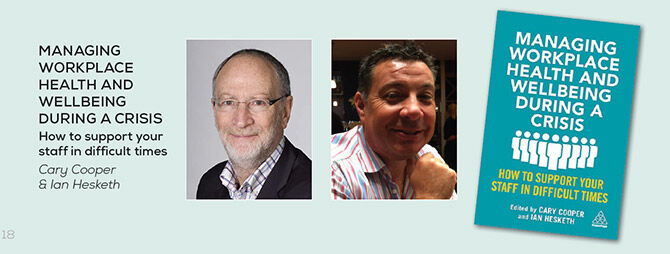What is the bigger picture for wellbeing, global mobility and the future of work?
As we approach the Future of Work Festival on 9 June at Relocate Global’s headquarters in Kent, Fiona Murchie outlines the opportunities ahead for resilient international organisations and their leadership teams who understand how to work effectively in global markets.

 5 April 2022
5 April 2022

Navigating the VUCA world
Well before the outbreak of the pandemic, multinational organisations – and particularly those with a HR global mobility department – were familiar with the VUCA world of continuous Volatility, Uncertainty, Complexity and Ambiguity.As Karen Sancto of Microsoft UK points out in her chapter, “As part of a global corporation, with many UK employees reporting to managers outside in another geography, we already had a remotely supported and agile workforce both from the business and from individuals themselves.“Deeply embedded within the company are two expectations: high impact and a growth mindset… Within this cultural framework there are also high expectations of resilience.”Microsoft were certainly already well ahead supporting their employees with wellbeing resources including learning, physical and emotional support, onsite fitness centres and clinicians, and gym membership.Many multinationals with size and scale to justify a global mobility team were also advanced in their appreciation of the value of supporting their global talent cope with the added complexities of working across borders and managing cross-cultural teams.But now we are in a new place as the world wakes up after two years of the coronavirus crisis and vaccinations make operations and work – remote, hybrid, cross-border and assignments of all lengths – feasible again in most regions. Regeneration and a rebound in productivity are essential to keeping not only businesses, but also countries and regions economically viable.I would strongly argue it is organisations that understand the value of supporting global mobility that will lead the way in the recovery.Related topics:
- Managing an ageing workforce in a millennial working world
- The implications of age diversity in multicultural team working
- What do graduates want from employers?
Sharing insights from the international arena
What we need to explore now is how the global management expertise, experience of international leadership built up over many years and the agility of such organisations can be adapted to the new challenges emerging as the Ukraine crisis unfolds and threatens to draw local, regional and global organisations into more global turmoil with a human impact unprecedented since 1945.Global mobility teams and supply chains have quietly and effectively spearheaded rapid responses to crises, as well as the deployment and evacuation of key personnel, in recent decades. First called to action in the Arab Spring in 2010 and honing their skills over the years since in good times and in bad, global mobility teams have proven they can instigate crisis management procedures, ranging from immigration and visa support to emergency evacuation and risk protocols, health policy and family support.The pandemic and now the war in Ukraine have cemented global mobility’s reputation as a core strategic business partner alongside HR with the emerging purpose-led, people-first approach. The importance of managing health and wellbeing in the current crisis and brought into sharp focus by recent events is a focus very much shared with the wider government and public sector world. This is why the learnings of Andy Rhodes, former Chief Constable of Lancashire Constabulary, is particularly pertinent.As Andy Rhodes points out, “At a personal level we are not supposed to exist in a state of VUCA for too long… the human brain was not designed to spend all day in fight or flight. We generally crave certainty, clarity, facts, routine and if we don’t get them, we can suffer from anxiety and stress.“Humans just aren’t cut out to live in a state of perpetual VUCA and, by recognising this, we are better equipped to start doing some practical things to help. The paradigm shift we need to make in a crisis is to see work as an opportunity to make our lives better, not worse.“Firstly, a good wellbeing plan will bring together the needs of the business, the evidence base and employee voice to create a shared purpose, grounded in the lived experience of the people nearest to the work.“Secondly, a good plan will have already brought together the people with the right skills, experience and passion you are going to need to work through the daily, hourly challenges created by a pandemic. You will have a team – even if it is in the loosest sense of the word – and therefore you will be able to rapidly gain a broader range of perspectives. This, as well as the connections back into vital areas such as HR policy, occupational health and staff networks.”Related topics:
- Working from anywhere – the hidden implications of cross-border and remote working
- The challenge and benefits of nurturing mental and financial wellbeing in global employees
- Partner employment access – the triple win
- Raising our game on diversity, equity and inclusion
Call to action for the next crisis
Surely international organisations can learn from this approach, leverage their networks and utilise more fully now and in the pandemic recovery the vital experience of the Global Mobility team and their myriad suppliers across relocation management companies, subcontractor destination service suppliers, travel, logistics and family support, including international schools and cross-cultural experts.This will support not only a company’s sustainable wellness, but also galvanise collaboration and knowledge sharing for whatever the future holds.The reality of war in Europe in the twenty-first century heralds the end of the silo approach to managing people. Dialogue must prevail across disciplines and industry sectors to enable rapid, clear communication and trust in expertise built up over decades to come to the fore.As highlighted by Andy Rhodes in his chapter, Rich Hanson’s three human needs provide the framework for a strategic response to a crisis:
- Safety – threats to physical, psychological and financial safety
- Connectedness – reduced connectedness and increased isolation
- Purpose – the potential to distract us from the organisation’s purpose.
Read more about the Great Return in the Spring 2022 issue of Think Global People.
To explore more widely the growing importance of wellbeing at work, why not join us on 9 June for the results of the Think Global People and Relocate Awards and the Future of Work Festival?
Subscribe to Relocate Extra, our monthly newsletter, to get all the latest international assignments and global mobility news.Relocate’s new Global Mobility Toolkit provides free information, practical advice and support for HR, global mobility managers and global teams operating overseas.
 Access hundreds of global services and suppliers in our Online Directory
Access hundreds of global services and suppliers in our Online Directory
©2026 Re:locate magazine, published by Profile Locations, Spray Hill, Hastings Road, Lamberhurst, Kent TN3 8JB. All rights reserved. This publication (or any part thereof) may not be reproduced in any form without the prior written permission of Profile Locations. Profile Locations accepts no liability for the accuracy of the contents or any opinions expressed herein.
































